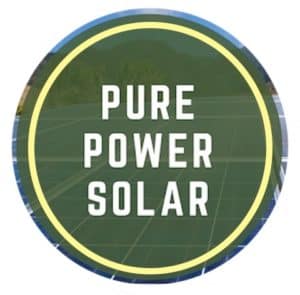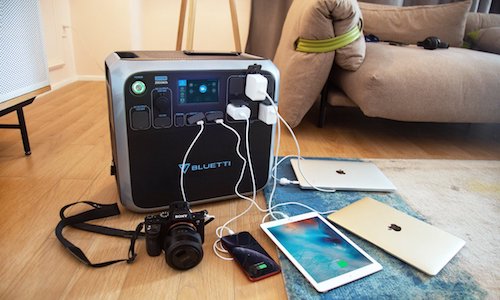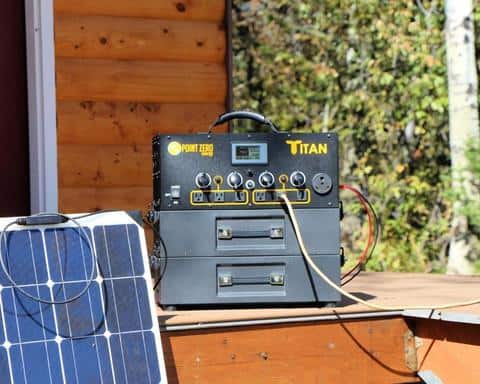The off-grid power capabilities of solar generators allow them to be used in several different environments to power appliances and electronics.
Solar generators can be used indoors. They don’t produce emissions as they are solely battery powered. It is recommended to use a solar generator in a cool, dry room in order to protect its internal components and prolong its battery life.
The best solar generator for use indoors (house, RV, etc.) is the Titan by Point Zero Energy.
It has one of the highest solar inputs and AC inverter outputs of all solar generators.
For more information on this system, I recommend reading my full review of it here: Titan Solar Generator Review – The Best Large Solar Generator?.
Solar generators provide power when the electric power grid normally used is lost through storms, accidents, and other natural or manmade disasters.
They can also be used for several other activities/purposes where off-grid power is needed.
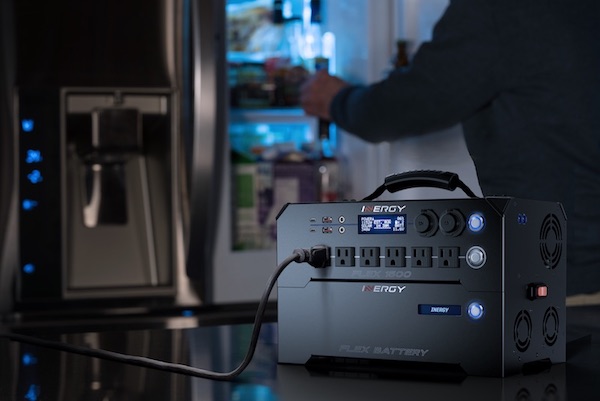
In this post, you’ll discover more about how solar generators have many uses indoors.
From running a full-size refrigerator to heating a home, there are several power needs that can be fulfilled with these systems.
This post goes into detail on the general questions regarding indoor solar generator use and the benefits/downsides of solar energy.
If you’re looking for help on how to install solar panels on your home or RV for an off-grid solar generator, read my article that walks you through the process here: Solar Panel Installation – Step-By-Step for Home and RV.
Solar Generators Are Safe to Use Indoors
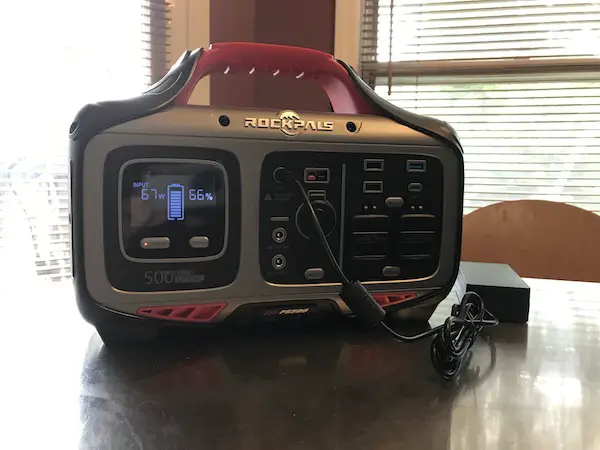
Solar generators are safe to use indoors because they do not emit fumes and have few moving parts. Typically, the only moving parts in a solar generator (also known as a portable power station) are its cooling fans.
Not only are solar generators safe to use indoors, but when the power goes out, a backup power source is good to have.
Gas generators once did the trick, but they’re loud, contribute to climate change, and emit dangerous, smelly fumes to clog up your nose and can eventually lead to asphyxiation indoors.
Solar generators have several benefits that gas generators cannot fulfill, including:
- Easy to use and maintain
- Don’t use fossil fuels
- Pays itself off longterm
- Can consistently be used in remote areas
Similar: Gas vs Solar Generators – Which Makes More Sense?
Using a Solar Generator During Emergencies
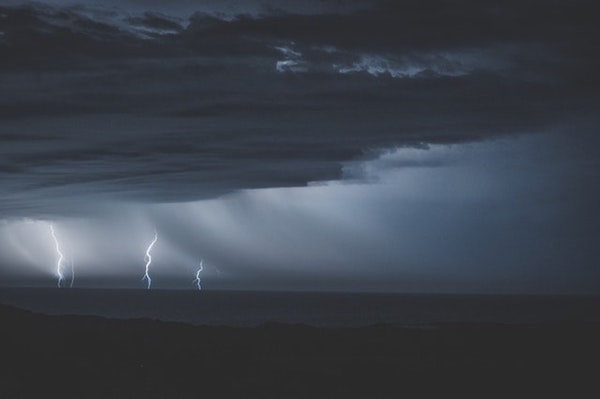
Just imagine any of the following scenarios without having access to a backup power source.
Most people in these situations wouldn’t have much chance for healthy survival without it:
Scenario 1 – A person needs power for their medical device
A CPAP machine is a must for people with sleep apnea.
A properly sized solar generator will provide the power needed for a good night’s rest when the power goes out.
Scenario 2 – Power outage in remote location during the winter

According to the U.S. Energy Information Administration, electric furnaces are one of the three most common heat sources for homes in the winter.
Most solar generators cannot power large home electric furnaces, however, they can provide consistent power to large space heaters to keep you warm when grid power is unavailable.
Scenario 3 – A large hurricane or natural disaster wipes out the community
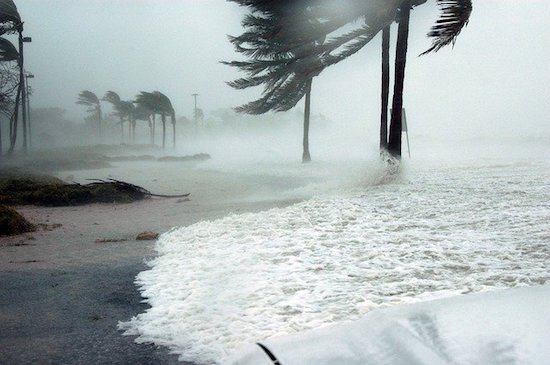
Although it’s not pleasant to think about, natural disasters can not only create structural damage to your property and community, but they can also cause extended power outages for more than a week.
During these times, gas shortages may occur as a result, making a gas generator useless after a couple of days off the grid.
A solar generator will be able to be used without the need to refuel it, as its solar panels take care of that for you.
Another possible scenario where power could be wiped out is after an EMP (Electromagnetic Pulse).
Although this is much less common than the other previous scenarios, you may be wondering if a solar generator can provide power after something like an EMP occurs.
The simple answer is that most cannot but some can. I give some insights into the ones that can as well as the science behind EMP-proofing in my post here: Are Solar Powered Generators EMP Proof? (Solutions & Analysis).
Solar Energy’s Positive Points
As you begin to consider purchasing a new solar generator, here are some of the reasons you will want to move forward with that decision:
- Increases property values
- Saves electricity
- Saves money longterm
- Protects environment
- Tax incentives (depending on location)
Although every reason doesn’t necessarily impact you personally, those are some compelling positives.
Solar Energy Has Negative Points Also
We live in the real world, so it’s obvious that everything isn’t daisies and sunshine. Therein lies some of the downsides to solar energy:
- Dependent on climate
- Doesn’t charge at night
- Inefficient
- Expensive initial investment
On cloudy days, solar panels are not going to bring in nearly as much energy from the sun as sunny days do.
In addition, a solar generator system for partial home backup is expensive to purchase. Although it pays off with consistent use over time, the initial investment is pricey.
Solar Generator Compatibility Requirements
Solar generators come in several different sizes. A portable power station for your home/apartment/RV should be on the larger end of this spectrum in terms of the system’s battery capacity.
Solar generators’ availability to power your appliances and electronics depends on:
- The battery size and output power of the solar generator
- The power consumption of your appliances
- Number of small or large appliances
- The maximum solar input of the power station (max number of solar panels used to recharge the battery)
Additional helpful information about solar generator sizing can be found via my articles below:
- Cabin Solar Generators – Sizing, Setup, and Cost Guide
- How Much Do Solar Generators Cost? (Pricing & Model Guide)
- What Can a Solar Generator Power? (Charging, Capacity, and More)
Where Can Solar Generators Be Used?

Solar generators can be used in RVs, homes, apartments, cabins, and sheds. They can also be used for activities such as tailgating, camping, and boondocking. Solar generators are not waterproof and they need to be used or stored within the temperature range of about 32-104 F (0-40 C).
Recreation Vehicles (RVs) may need to stop where there is no power, but those with a solar generator seldom have any reason for concern.
In fact, solar generators can be used anywhere, including in the home, to boost energy planning. Their use also extends to office buildings and other commercial sites.
“Solar generators can power some key appliances in your home for emergencies.”
~ Catherine Lane, Author at Solar Review
While the statement above is true for portable solar generators, larger stationary solar units also exist.
Large Solar Generator Uses
These have more capacity for powering larger appliances. Larger units are either installed permanently or placed on a wheeled cart for transporting the unit.
An example of a large solar generator with a roll cart is the Goal Zero Yeti 6000X – Check it out via the link here: Yeti 6000X Review – Goal Zero’s Most Powerful Solar Generator.
Below is a list of items for the home that a large solar generator can power:
- Well pump
- Small air conditioner
- Attic fan
- Full-size refrigerator
- Microwave
- Toaster
- Space heater
- Ventilation fans
Charging a Solar Generator – Methods + Best Practices
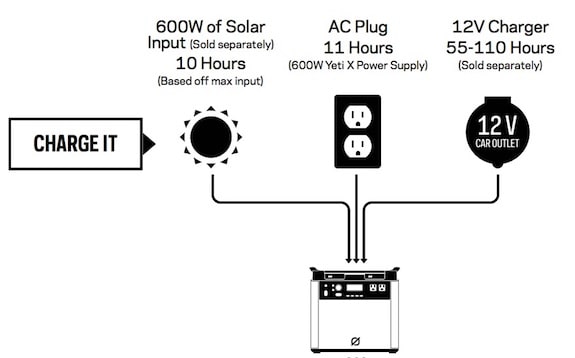
You might question why a solar generator needs charging. It’s a good question.
Here’s the answer: Indoor solar generators have to be charged when they run out of the electricity they receive from the sun.
This direct current (DC) power from the sun is brought to the battery to charge it up.
USB ports and 12V ports use DC power from the battery, but the wall outlets on most solar generators convert the DC power to alternate current (AC) power for use with correlating household appliances.
There are three main methods of charging the batteries in an indoor solar generator power system:
- AC wall charging
- Solar charging
- Wind turbine charging
It can take several hours to charge a solar generator’s battery depending on the solar input and battery size.
Be sure you have time to get it fully charged before nightfall.
It’s best to make a habit of charging the system just after waking in the morning. Then you can get on with your day without worrying whether you’ll have power or not.
With the proper solar panel set up, you won’t have to worry about recharging the system as it will automatically charge up when needed.
However, during cloudy days, it may be useful to charge it from the wall outlet at home if you’d like to have a fully-charged battery before the sun goes down.
Solar Monitoring System
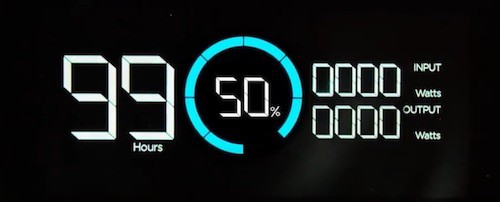
The importance of using a solar monitoring system helps you know if your solar installation is productive and effective enough.
When using a solar generator in your home, safety should be the first concern.
I recommend consulting a professional to help you construct your solar panel array so it will be as effective as possible.
The amperage and voltage of the solar panel(s) need to be congruent with the solar input specifications of the solar generator’s charge controller.
Most solar generators have LCD screens with this information available to you, which makes it much easier to use with solar.
Making the Decision to Purchase a Solar Generator

You’ve seen reasons why you should and shouldn’t use a solar generator in your home, where they can or can’t be used, and if they can be used indoors, how they get their charge.
The main concern in a crisis scenario is the comfort and security of yourself and your family. A solar generator will be able to provide you with power off the grid for essential devices and appliances.
But solar generators can be useful for several other needs regardless of power outages, such as:
- Powering your sump pump, refrigerator, and/or other appliances to cut down on utility costs
- Using it to power an off-grid cabin
- Use in a shed for construction purposes where there is no accessible utility power
- In an RV to power all or some appliances
In Conclusion
The advantages of solar generators far outweigh the disadvantages.
Having a backup solar generator system in place for the inevitable power failure is clearly in your best interest.
A solar generator is a valuable investment for the safety and security of those you hold dear.
Off-grid power is an asset that can help you in several scenarios, not just crisis situations.
If you’re interested in the pricing of solar generator systems, I recommend reading my article directly answering this – find it here: Are Portable Solar Generators Too Expensive?
For some examples of long-lasting solar generators, I have a post with six examples that use the best battery type, called LiFePO4 (lithium-iron-phosphate) batteries.
These batteries last anywhere from two to twelve times longer than lithium-ion and lead-acid batteries! Check it out here: 6 Best LiFePO4 Solar Generators (Stats, Pricing, and Analysis).
